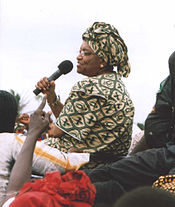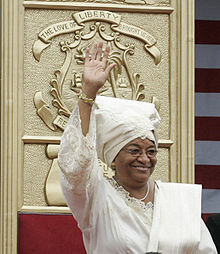Ellen Johnson Sirleaf
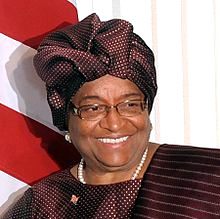
Liberia Johnson Sirleaf inauguration
While many celebrate the first woman president in Africa for her second term, Ellen Johnson Sirleaf may be looking at a grim path ahead. Liberia is deeply rooted in corruption and many are looking at this second term as a possible answer to the country’s woes.
Ellen Johnson Sirleaf (born 29 October 1938) is the 24th and current President ofLiberia. She served as Minister of Finance under President William Tolbert from 1979 until the 1980 coup d’état, after which she left Liberia and held senior positions at various financial institutions. She was one of the founders and the political leader of National Patriotic Front of Liberia, the warlord Charles Taylor‘s party. She placed second in the 1997 presidential election won by Charles Taylor. She won the 2005 presidential electionand took office on 16 January 2006, and she was a successful candidate for re-election in 2011. Sirleaf is the first elected female head of state in Africa. Sirleaf was awarded the 2011 Nobel Peace Prize, jointly with Leymah Gbowee of Liberia and Tawakel Karman of Yemen. The women were recognized “for their non-violent struggle for the safety of women and for women’s rights to full participation in peace-building work.”
Family background
Johnson Sirleaf’s father was Gola, while her mother had a German father and Kru mother. While not Americo-Liberian by ancestry, Sirleaf is considered culturally Americo-Liberian by some observers or assumed to be Americo-Liberian. However, Sirleaf does not identify as such. Sirleaf’s father, Jahmale Carney Johnson, was born into an impoverished rural region. He was the son of a minor Gola chief named Jahmale and one of his wives, Jenneh, in Julijuah, Bomi County. Her father was sent to Monrovia, where his last name was changed to Johnson because of his father’s loyalty to President Hilary R. W. Johnson, Liberia’s first Liberian-born president. He grew up in Monrovia, where he was raised by an Americo-Liberian family with the surname McCritty. Sirleaf’s father later became the first Liberian from an indigenous ethnic group to sit in the country’s national legislature. Sirleaf’s mother was also born into poverty in Greenville, Liberia. Her grandmother Juah Sarwee sent Sirleaf’s mother to Monrovia when Sirleaf’s German grandfather had to flee the country after Liberia declared war on Germany during World War I. A member of a prominent Americo-Liberian family, Cecilia Dunbar, adopted and raised Sirleaf’s mother.
Early life and career
Sirleaf was born in Monrovia, and studied economics and accounting from 1948 to 1955 at the College of West Africa in Monrovia. She married James Sirleaf when she was 17 years old, and then traveled with him to the United States in 1961 to continue her studies and earned an accounting degree at Madison Business College, in Madison, Wisconsin. In 1970, she studied at the Economics Institute – an affiliate summer program of the Department of Economics at the University of Colorado Boulder. Sirleaf studied economics and public policy at Harvard’s John F. Kennedy School of Government from 1969 to 1971, gaining a Master of Public Administration. She then returned to her native Liberia to work under the government of William Tolbert, where she became the Assistant Minister of Finance. While in that position, she attracted attention with a “bombshell” speech to the Liberian Chamber of Commerce that claimed that the country’s corporations were harming the economy by hoarding or sending overseas their profits. Sirleaf served as assistant minister from 1972 to 1973 under Tolbert’s administration. She resigned after getting into a disagreement about spending. Subsequently she was Minister of Finance from 1979 to April 1980. Master Sergeant Samuel Doe, a member of the indigenous Krahn ethnic group, seized power in an 12 April 1980 military coup; Tolbert was assassinated and all but four members of his cabinet were executed by firing squad. The People’s Redemption Council took control of the country and led a purge against the former government. Sirleaf initially accepted a post in the new government as President of the Liberian Bank for Development and Investment, though she fled the country in November 1980 after publicly criticizing Doe and the People’s Redemption Council for their management of the country. Sirleaf initially moved to Washington, D.C., to work for the World Bank before moving to Nairobi in 1981 to serve as Vice President of the African Regional Office of Citibank. She resigned from Citibank in 1985 following her involvement in the 1985 election in Liberia and went to work for Equator Bank, a subsidiary of HSBC. In 1992, Sirleaf was appointed as the Director of the United Nations Development Programme‘s Regional Bureau for Africa at the rank of Assistant Administrator and Assistant Secretary General (ASG), from which she resigned in 1997 to run for president in Liberia. During her time at the UN, she was one of the seven internationally eminent persons designated in 1999 by the Organization of African Unity to investigate the Rwandan genocide, one of the five Commission Chairs for the Inter-Congolese Dialogue and one of two international experts selected by UNIFEM to investigate and report on the effect of conflict on women and women’s roles in peace building. She was the initial Chairperson of the Open Society Initiative for West Africa (OSIWA) and a visiting Professor of Governance at the Ghana Institute of Management and Public Administration (GIMPA).
Political career – 1985 general election
While working at Citibank, Sirleaf returned to Liberia in 1985 to run for Vice President on the ticket of the Liberian Action Party in the 1985 elections. However, Sirleaf was placed under house arrest in August of that year and soon after sentenced to ten years in prison for sedition as a consequence of a speech in which she insulted the members of the Doe regime. Following international calls for her release, Doe pardoned and released her in September. Due to government pressure, she was removed from the presidential ticket and instead ran for a Senate seat in Montserrado County. Though the elections, which saw Doe and the National Democratic Party win the presidency and large majorities in both houses, were widely condemned as neither free nor fair, Sirleaf was declared the winner of her Senate race. Sirleaf refused to accept the seat in protest of the election fraud. After an attempted coup against the Doe government by Thomas Quiwonkpa on 12 November, Sirleaf was arrested and imprisoned again on 13 November by Doe’s forces. Despite continuing to refuse to accept her seat in the Senate, she was released in July 1986 and secretly fled the country to the United States later that year.
1997 presidential campaign
At the beginning of the First Liberian Civil War in 1989, Sirleaf supported Charles Taylor‘s rebellion against Doe, helping raise money for the war. Because of this Sirleaf was later recommended a 30 year ban from politics. However, she later opposed Taylor’s handling of the war. By 1996, the presence of Economic Community of West African States (ECOWAS) peacekeepers led to a cessation of hostilities, resulting in the 1997 general election, which Sirleaf returned to Liberia to contest. As the presidential candidate for the Unity Party, she placed second in a controversial election, getting 25% of the vote to Charles Taylor’s 75%. Sirleaf left the country soon after and again went into exile in Abidjan.
2005 presidential campaign
After the end of the Second Liberian Civil War and the establishment of a transitional government, Sirleaf was proposed as a possible candidate for chairman of the government. Ultimately, Gyude Bryant, a political neutral, was chosen as chairman, while Sirleaf served as head of the Governance Reform Commission. Sirleaf once again stood for president as the candidate of the Unity Party in the 2005 general election. She placed second in the first round of voting behind footballer George Weah. In the subsequent run-off election, Sirleaf earned 59% of the vote versus 40% for Weah, though Weah disputed the results. The announcement of the new leader was postponed until further investigations were carried out. On 23 November 2005, Sirleaf was declared the winner of the Liberian election and confirmed as the country’s next president. Her inauguration, attended by many foreign dignitaries, including United States Secretary of State Condoleezza Rice and First Lady Laura Bush, took place on 16 January 2006.
2011 presidential campaign
In January 2010, Sirleaf announced that she would run for a second term in office in the 2011 presidential election while speaking to a joint session of the Legislature. Opposition leaders noted that in doing so, she had broken a promise made during her 2005 campaign to only serve one term if elected. Sirleaf was renominated as the Unity Party’s presidential candidate at the party’s national convention on 31 October 2010. That same day, Vice President Joseph Boakai was nominated by Sirleaf and confirmed by the delegates as Sirleaf’s running mate. The awarding of the Nobel Peace Prize to Sirleaf four days prior to the election sparked criticism from opposition parties, with Congress for Democratic Change candidate Winston Tubman calling the award “undeserved” and “a political interference in our country’s politics.” Sirleaf called the timing of the award a coincidence and avoided mentioning the award during the final days of campaigning. Sirleaf garnered 43.9% of the vote in the first round, more than any other candidate but short of the 50% needed to avoid a run-off. Tubman came in second with 32.7%, pitting him against Sirleaf in the second round. Tubman called for a boycott of the run-off, claiming that the results of the first round had been fraudulent. Sirleaf denied the allegations, and international observers reported that the first round election had been free, fair and transparent. As a result of the boycott, Sirleaf won the second round with 90.7% of the vote, though voter turnout significantly declined from the first round. Following the election, Sirleaf announced the creation of a “national peace and reconciliation initiative,” led by Nobel Peace Prize laureate Leymah Gbowee, to address the country’s divisions and begin “a national dialogue that would bring us together.” She took presidential oath for her second presidency on 16 January 2012.
Presidency – Domestic policy
A fire broke out at the Executive Mansion on 26 July 2006, seriously damaging the structure. An independent panel formed to investigate the incident ruled out arson, attributing the fire to an electrical malfunction. Sirleaf’s government called funding for the repair of the mansion a low priority in the face of more pressing needs, with Sirleaf transferring her office to the nearby Foreign Ministry building and choosing to live at her personal home in Monrovia. On 26 July 2007, Sirleaf celebrated Liberia’s 160th Independence Day under the theme “Liberia at 160: Reclaiming the future.” She took an unprecedented and symbolic move by asking 25-year-old Liberian activist Kimmie Weeks to serve as National Orator for the celebrations, where Weeks called for the government to prioritize education and health care. A few days later, President Sirleaf issued an Executive Order making education free and compulsory for all elementary school aged children. In October 2010, Sirleaf signed into law a Freedom of Information bill, the first legislation of its kind in West Africa. In recognition of this, she became the first sitting head of state to receive the Friend of the Media in Africa Award from The African Editor’s Union. On 1 April 2011, Sirleaf told reporters that she planned to charge an opposition candidate with sedition for organizing a rally protesting corruption in the government. Her press secretary later clarified that the remark had been an April Fools’ prank.
Debt relief
From the beginning of her presidency, Sirleaf vowed to make reduction of the national debt, which stood at approximately US$4.9 billion in 2006, a top priority for her administration. The United States became the first country to grant debt relief to Liberia, waiving the full $391 million owed to it by Liberia in early 2007. In September of that year, the G-8 headed by German ChancellorAngela Merkel provided $324.5 million to paying off 60% of Liberia’s debt to the International Monetary Fund, crediting their decision to the macroeconomic policies pursued by the Sirleaf administration. In April 2009, the government successfully wrote off an additional $1.2 billion in foreign commercial debt in a deal that saw the government buy back the debt at a 97% discounted rate through financing provided by the International Development Association, Germany, Norway, the United States and the United Kingdom. The discounted rate was the largest ever for a developing country. The country was deemed eligible to participate in the Heavily Indebted Poor Countries initiative in 2008. In June 2010, the country reached the completion point of the HIPC initiative, qualifying it for relief from its entire external debt. That same month, the World Bank and IMF agreed to fund $1.5 billion in writing off the Liberia’s multilateral debt. On 16 September, the Paris Club agreed to cancel $1.26 billion, with independent bilateral creditors canceling an additional $107 million, essentially writing off Liberia’s remaining external debt. Sirleaf vowed to prevent unsustainable borrowing in the future by restricting annual borrowing to 3% of GDP and limiting expenditure of all borrowed funds to one-off infrastructure projects.
Truth and Reconciliation Commission
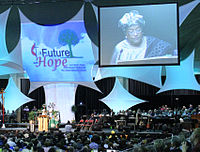 President Sirleaf addressing the 2008 General Conference of the United Methodist Church in Fort Worth, Texas.
President Sirleaf addressing the 2008 General Conference of the United Methodist Church in Fort Worth, Texas.
In 2006, Sirleaf established a Truth and Reconciliation Commission with a mandate to “promote national peace, security, unity and reconciliation” by investigating more than 20 years of civil conflict in the country. In their final report, issued in June 2009, the TRC included Sirleaf in a list of 50 names of people that should be “specifically barred from holding public offices; elected or appointed for a period of thirty (30) years” for “being associated with former warring factions.” The proposed ban stemmed from her financial support of former President Taylor in the initial months of the First Liberian Civil War. On 26 July 2009, Sirleaf apologized to Liberia for supporting Charles Taylor saying, “When the true nature of Mr. Taylor’s intentions became known, there was no more impassioned critic or strong opponent to him in a democratic process” than she. On 28 August, the Legislature announced they must “consult our constituents for about a year” before deciding whether or not to implement the Commission’s recommendations. During an appearance at the Council on Foreign Relations in 2010, Sirleaf argued that the implementation of the TRC’s recommended ban would unconstitutionally violate her right to due process. In October 2010, the chairman of Sirleaf’s Unity Party, Varney Sherman, argued that implementation of the recommendation would be unconstitutional, as Article 21(a) of the Constitution prohibits ex post facto laws, and Sirleaf had broken no law by financially supporting Taylor that imposed a ban from public office as a penalty. In January 2011, the Supreme Court ruled in Williams v. Tah, a case brought by another person recommended for being banned from public office in the TRC report, that the TRC’s recommendation was an unconstitutional violation of the listed individuals’ right to procedural due process, and that it would be unconstitutional for the government to implement the proposed bans.
Gay rights
Following a speech made by United States Secretary of State Hillary Clinton in December 2011 that America’s foreign aid would be used to promote the protection of gay rights, the issue of LGBT rights became a significant political topic in Liberia. According to The Guardian, “Since Clinton’s remarks, Liberian newspapers have published numerous articles and editorials describing homosexuality as “desecrating”, “abusive” and an “abomination.” Liberian law made “voluntary sodomy” punishable by up to one year in prison, although it has not been used to prosecute anyone in several years. In February 2012, Bong County Senator Jewel Taylor proposed a bill that would carry a term of ten years in prison for homosexual activity, while a similar bill was introduced in the House of Representatives. On 19 March, Sirleaf addressed the issue, saying that she would not repeal the current law but would also not sign into law either of the two proposed bills. Sirleaf added, “We like ourselves just the way we are […] We’ve got certain traditional values in our society that we would like to preserve.” According to Tiawan Gongloe, Liberia’s former Solicitor General, “If she tried to decriminalise the [current anti-gay] law it would be political suicide.” In a letter to The Guardian, Sirleaf’s press secretary challenged the portrayal of her remarks in the media pointing out: “There currently exists no law referencing homosexuality in Liberia, and as such the President could not be defending a law on homosexuality. The President is on record as saying […] that any law brought before her regarding homosexuality will be vetoed. This statement also applies to an initial attempt by two members of the Liberian legislature to introduce tougher laws targeting homosexuality.” The letter added “the status quo in Liberia has been one of tolerance and no one has ever been prosecuted under that [current] law,” and referred to freedom of expression and open debate. The Guardian published a correction to its story, “Nobel peace prize winner defends law criminalising homosexuality in Liberia was updated to restore material cut in the editing process. The restored material clarifies the stance that President Ellen Johnson Sirleaf is taking on laws concerning homosexuality in Liberia. That is: she refuses to dismantle the existing anti-sodomy law, while also saying she will refuse to sign two new bills that would toughen laws on homosexuality.” A conclusion to be drawn is that she favors the continued criminalisation of homosexual acts but is content with the current level of punishment and is unwilling to make tolerance the law. A view she reaffirmed during an interview with Tony Blair.
Foreign policy
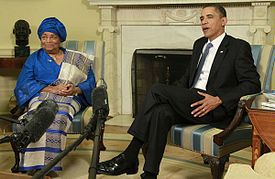 President Sirleaf meets with President Barack Obama at the White House in 2010.
President Sirleaf meets with President Barack Obama at the White House in 2010.
Upon her election to office, Sirleaf made her first foreign trip as President to neighboring Côte d’Ivoire, meeting with Ivorian President Laurent Gbagbo in an attempt to repair relations between the two countries following Côte d’Ivoire’s support of the Movement for Democracy in Liberia during the Second Liberian Civil War. During the 2010–2011 Ivorian crisis, Sirleaf, as chairperson of the Mano River Union, supported ECOWAS’s recognition of Gbagbo’s opponent, Alassane Ouattara, as the winner of the disputed presidential election, but rejected calls for a military solution to the crisis. Sirleaf has forged close relations with the United States, Liberia’s traditional ally. Following the establishment of United States Africa Command (AFRICOM) by the United States military, Sirleaf offered to allow the US to headquarter the new command in Liberia, the only African leader to do so. The command was eventually headquartered in Stuttgart, Germany. On 15 March 2006, President Sirleaf addressed a joint meeting of the United States Congress, asking for American support to help her country “become a brilliant beacon, an example to Africa and the world of what love of liberty can achieve.” Sirleaf has also strengthened relations with the People’s Republic of China, reaffirming Liberia’s commitment to the One-China policy. In return, China has contributed to Liberia’s reconstruction, building several transmitters to extend the Liberia Broadcasting System nationwide and constructing a new campus for the University of Liberia. Sirleaf is a member of the Council of Women World Leaders, an international network of current and former women presidents and prime ministers whose mission is to mobilize the highest-level women leaders globally for collective action on issues of critical importance to women and equitable development. During the 2011 Libyan civil war, Sirleaf added her voice to a chorus of calls from the international community for Libyan leaderMuammar al-Gaddafi to cease the use of violence and tactics of political repression. However, she criticized the international military intervention in Libya, declaring that “violence does not help the process whichever way it comes.” Her government later severed diplomatic ties with Libya, stating that “The Government took the decision after a careful review of the situation in Libya and determined that the Government of Colonel Gaddafi has lost the legitimacy to govern Libya.”


